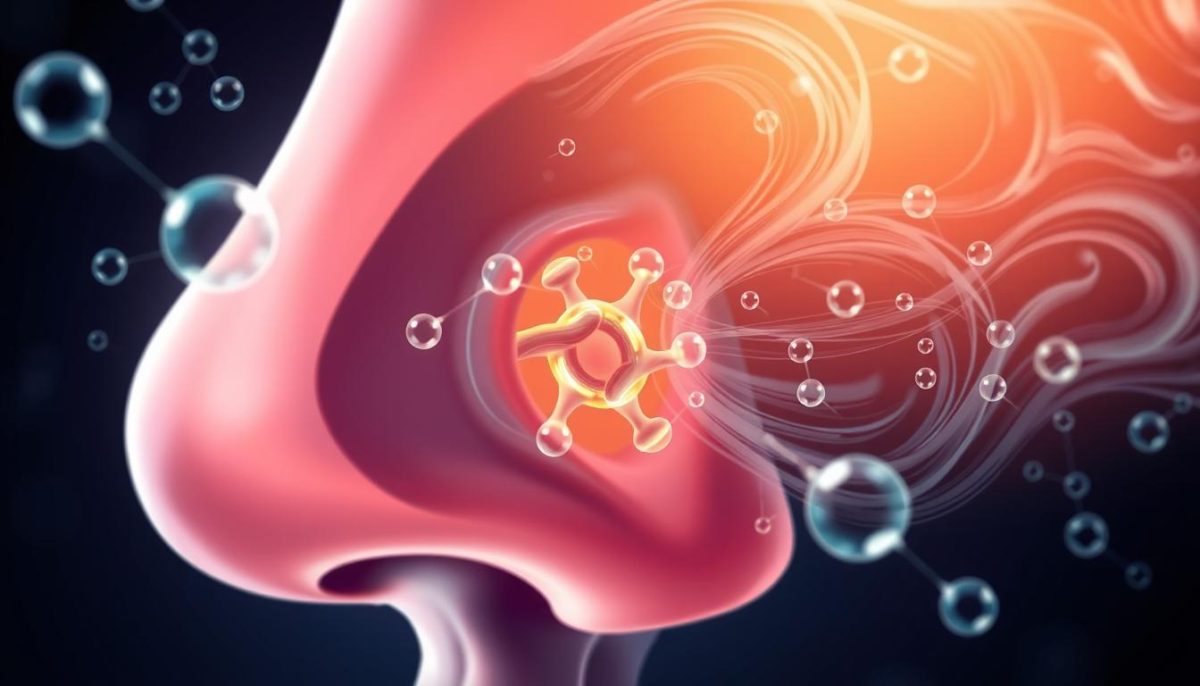As we navigate the complexities of our daily lives, we may occasionally encounter an unexpected and puzzling phenomenon – the presence of an ammonia-like smell in our noses. This unusual olfactory experience, often described as “phantom smells” or “olfactory hallucinations,” can be a source of concern for many individuals. In this article, we’ll explore the common triggers, underlying causes, and potential medical conditions associated with this peculiar sensation, ultimately guiding you towards natural remedies and effective treatment options.
Understanding the Ammonia Smell in Nose and Its Common Triggers
When it comes to the perplexing issue of an ammonia-like odor in the nose, it’s crucial to understand the underlying causes. This pungent scent can arise from various factors, including changes in our body’s chemical composition, environmental influences, and even sinus-related health concerns.
Chemical Changes in Body Chemistry
One of the primary triggers for the ammonia smell can be traced back to our own metabolic processes. Conditions such as metabolic disorders, imbalances in dehydration levels, and certain dietary factors can all contribute to the production of volatile compounds that give rise to this distinctive odor.
Environmental Factors Contributing to Ammonia Odors
But the story doesn’t end there. External environmental factors can also play a significant role in the presence of this nasal anomaly. Exposure to air pollution, the presence of bacterial growth, and even changes in air quality can all trigger the perception of an ammonia-like scent.
Role of Sinus Infections and Nasal Health
Another key factor to consider is the impact of sinus-related issues. Sinusitis and other nasal health problems can disrupt the delicate balance of our olfactory system, leading to a heightened sensitivity to various odors, including the dreaded ammonia smell.
By understanding these common triggers, we can take proactive steps to address the root causes and find relief from this perplexing nasal ailment.

“Identifying and addressing the underlying causes of the ammonia smell is crucial for restoring our nasal health and overall well-being.”
Medical Conditions Associated with Ammonia-Like Nasal Odors
While an occasional ammonia-like scent in the nose can be harmless, it may also indicate an underlying medical condition that requires attention. Understanding the potential causes can help us recognize when to seek professional guidance.
One common culprit is chronic kidney disease. When the kidneys are unable to effectively filter waste products, ammonia can build up in the body, potentially leading to noticeable odors. Similarly, liver cirrhosis can impair the liver’s ability to metabolize ammonia, resulting in a similar issue.
Another rare condition, trimethylaminuria, is characterized by the body’s inability to properly break down trimethylamine, a compound that can cause a fishy or ammonia-like smell. This genetic disorder may also be linked to certain neurological disorders, highlighting the complex interplay between our senses and underlying health.
Diabetes can also contribute to ammonia-like nasal odors, as the body’s inability to regulate blood sugar levels can lead to the production of acetone, which has a distinctive scent. Addressing the primary health concern is crucial in these cases.
| Medical Condition | Description | Potential Causes of Ammonia-Like Odor |
|---|---|---|
| Chronic Kidney Disease | A gradual decline in kidney function | Buildup of waste products, including ammonia, in the body |
| Liver Cirrhosis | Scarring and damage to the liver | Impaired ability to metabolize ammonia |
| Trimethylaminuria | Genetic disorder affecting the breakdown of trimethylamine | Increased levels of trimethylamine, which has a fishy or ammonia-like odor |
| Diabetes | Impaired ability to regulate blood sugar levels | Production of acetone, which has a distinctive scent |
By recognizing the potential medical conditions associated with ammonia-like nasal odors, we can take proactive steps to address the underlying issue and improve our overall health and well-being.

Natural Remedies and Treatment Options for Nasal Ammonia Smell
If you’re experiencing an ammonia-like odor in your nose, we have some practical solutions to help you find relief. One effective natural remedy is nasal irrigation, which involves using a saline solution to flush out your nasal passages and sinuses. This can help reduce irritation and remove any buildup that may be contributing to the odor.
Making some dietary changes can also make a difference. Increasing your intake of hydrating foods and beverages can help dilute the ammonia in your body, while reducing your consumption of high-protein foods may also alleviate the smell. Incorporating probiotic-rich foods or supplements can also be beneficial, as they can help maintain a healthy gut microbiome and potentially minimize the production of ammonia.
Essential oils, such as peppermint or eucalyptus, have been known to provide a refreshing and cleansing effect when used aromatically or topically around the nose. These natural remedies may help mask or reduce the ammonia-like odor you’re experiencing. However, if the issue persists or worsens, it’s important to consult with a healthcare professional, as they can identify and address any underlying medical conditions that may be the root cause of the nasal ammonia smell.











